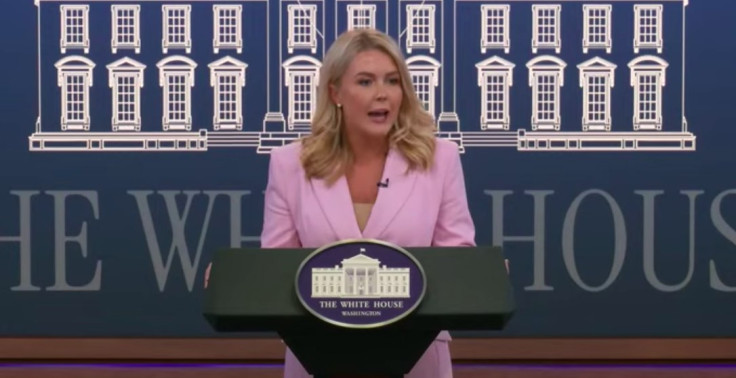'My Uber Drivers Finally Speak English Again': MAGA Influencer Sparks Outrage At White House Briefing
White House influencer session criticised for staged questions, trivialiisng serious issues, and favoring pro-Trump voices.

A White House briefing aimed at courting social media influencers has sparked backlash after a pro-Trump content creator claimed her Uber drivers 'finally speak English again' — a remark widely condemned as xenophobic.
The event, led by Press Secretary Karoline Leavitt and billed as a landmark moment for 'transparency,' has drawn criticism for prioritising partisan voices and offering little in the way of meaningful substance.
The Briefing
Leavitt opened the session by emphasising that it was the White House's first official influencer briefing, claiming the administration was engaging with 'all media outlets'—though it was clear the focus was on pro-Trump voices. She said that social media and independent channels now dominate news consumption, showing that their method of communication was uniquely accessible. Her tone was upbeat before calling on the first influencer, Arynne Wexler.
Wexler's opening comment set the tone for the event: 'Thanks so much, Karoline — for having us and for granting me the first question. I can attest to the deportations in Florida. My Uber drivers finally speak English again, so thank you for that.' The remark drew light laughs from the crowd, but also drew criticism online for making light of serious policy issues. Her question then moved to what the administration plans to do about those who defy federal laws—particularly on trans women in sports—causing Leavitt's response about consequences for not complying.
@voteinorout In January 2025, the White House under President #DonaldTrump introduced a significant shift in media engagement by establishing a “New Media Press Briefing Room.” This initiative, led by Press Secretary KarolineLeavitt, aimed to incorporate non-traditional media voices—such as podcasters, social media influencers, and independent journalists—into the White House press corps. Leavitt emphasized the need to adapt to the evolving media landscape, citing a Gallup poll indicating a record low in Americans’ trust in mass media. The new media seat, added to the James S. Brady Briefing Room, was made available to applicants meeting specific criteria and passing Secret Service requirements . This move was part of a broader strategy to diversify the sources through which the administration communicates its message.   The first “influencer meeting” hosted by the White House featured prominent pro-Trump figures, including former Press Secretary SeanSpicer. These meetings, distinct from traditional press briefings, provided a platform for conservative media personalities aligned with the MAGA movement to engage directly with the administration . While supporters viewed this as a democratization of media access, critics argued it blurred the lines between journalism and advocacy, potentially undermining journalistic accountability. The inclusion of such figures in official briefings marked a notable departure from previous administrations’ media relations, reflecting the Trump administration’s ongoing efforts to reshape its communication strategies.   #DonaldTrump #KarolineLeavitt #SeanSpicer #NewMedia #WhiteHousePressBriefing #MAGA #MediaTrust #PressAccess #Journalism #Influencers repost @hereswhykevin
♬ original sound - voteinorout
The Questions were Pro-Trump
The briefing was filled with questions that looked like they were designed to flatter the administration rather than challenge it. Sean Spicer, who served as White House press secretary in 2017, asked why mainstream outlets like ABC and The Atlantic are still granted access, despite his assertion that the White House should prioritise 'new media' voices. Leavitt responded that President Trump is 'unafraid' of competition, hinting that this inclusion is intentional.
Another influencer, Rogan O'Handley, known as 'DC Draino', asked about the long-promised Jeffrey Epstein files. His question was straightforward: 'Do you have any updates from the DOJ or FBI on when those files will be released and when arrests might happen?' Leavitt's reply was vague but reassuring, claiming the Department of Justice was working diligently, although she didn't provide a concrete timeline.
A Media Circus or a Genuine Shift?
Perhaps most startling was a question from Kambree Nelson, a self-described 'policy nerd', who asked the White House for direct guidance on reporting practices. She asked, 'What direction do you advise me to go into, especially regarding your daily reports?' Leavitt responded with a compliment about her focus on facts rather than sensationalism—an answer that appeared to encourage her to continue along her current path.
The briefing concluded with a round of applause from the influencers, who praised Leavitt for her 'leadership' and thanked her for the opportunity. Leavitt, clearly relishing the praise, remarked, 'Thanks for what you do,' before stepping down from the podium. Her departure was met with enthusiastic clapping from the assembled crowd, reinforcing the event's tone as a staged show of unity.
Accusations of Propaganda
The event has sparked widespread criticism. Many see it as a carefully curated spectacle aimed at boosting pro-Trump influencers while marginalising mainstream media. Critics argue that questions from the influencers were more about boosting the administration's image than holding it accountable.
The claim by Wexler about her Uber drivers speaking English again has been met with much online opposition. Netizens say it minimises complex immigration and employment issues, making policy into a punchline. Meanwhile, others question whether this kind of outreach genuinely reflects a commitment to transparency or is simply political theatre.
© Copyright IBTimes 2025. All rights reserved.




















